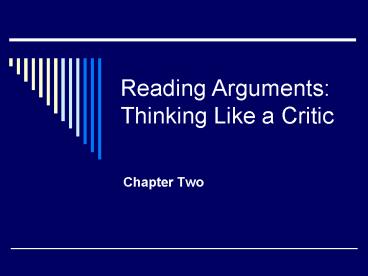Reading Arguments: Thinking Like a Critic - PowerPoint PPT Presentation
1 / 17
Title:
Reading Arguments: Thinking Like a Critic
Description:
How are key terms defined, if at all? Why is a particular observation or ... binge drinking or died as a result of a car accident involving a binge drinker ... – PowerPoint PPT presentation
Number of Views:109
Avg rating:3.0/5.0
Title: Reading Arguments: Thinking Like a Critic
1
Reading Arguments Thinking Like a Critic
- Chapter Two
2
What is Critical Reading?
- Asking Questions
- What is meant by that phrase?
- How is a claim supported?
- How are key terms defined, if at all?
- Why is a particular observation or example
important? - How is a conclusion arrived at?
- Do other experts agree?
- Is evidence up to date?
3
Why Read Critically?
- Allows you to understand a writers point and the
justification for their view - Helps you better understand how arguments are
made, which will sharpen your own argumentation
and writing skills - Enables you to get beyond your own opinions so
that you can begin to form informed judgements
4
Preview the Reading
- Who is the Writer?
- Where was article originally published?
Credibility. - When was the article originally published?
- How does the title signal the authors attitude
and possible bias?
5
Skim the Reading
- First reading to identify the thesis
- Identify main points of support
- Identify authors point-of-view or bias
- Second reading can then focus on the details how
each point is supported.
6
Binge Drinking Must be Stopped Henry Wechsler
- Who is author? Where and when published? Why
relevent? - Skim it what is thesis and main support?
- Now critically read it
- How are the main points of the argument
supported? - Does the writer write with a perceived bias?
- What is the writers purpose?
7
Consider your own experience and knowledge of
subject
- When are your own experiences valid to bring up
in your writing? - If you have an authoritative knowledge of the
subject - If you have a compelling story and/or point of
view - For example, if you were in a Fraternity and
witnessed binge drinking - If your son or daughter died or were hospitalized
as a result of binge drinking or died as a result
of a car accident involving a binge drinker - What is the value of anecdotal evidence?
8
Annotate the Reading
- Highlight or underline key passages
- Write questions in the margins
- Circle words or phrases that you dont understand
- Jot down examples to support or challenge claims
- Draw lines between related ideas
- Observe transitions or qualifiers
- Mark difficult passages that need to be read
again more carefully
9
Summary
- Summary captures the thesis and essential ideas
of a passage - Shorter than original
- Written in your own words
- Objective
- Accurate
- Thorough
- If you summarize, be sure to cite your source in
text (According to or in a bibliographical
citation)
10
Analyze and Evaluate Reading
- To analyze is to break something down into its
parts and look carefully at those parts
individually and how they fit together - What assumptions are made?
- What kind of audience is being addressed?
- What is writers purpose?
- What kind of evidence and support is offered?
- Does the logic seem reasonable?
- Did the writer address opposing views?
11
Argue with the Reading
- Just because something is published doesnt make
it true you should always challenge and question
what a speaker or writer says - Strive to be objective in your analysis be aware
of your own bias and strive to rise above it as
you argue with the reading
12
Examples of Arguing with the Text on Binge
Drinking
- Does binge drinking happen at all colleges or
only some? What support is offered? - Do all students engage in it or is it more common
among certain groups, gender, frats, residents or
non-residents? - Do college students drink more than non-college
students of same age group? - Are colleges responsible for monitoring student
behavior during non-class hours? Is it realistic
to expect them to do so? - Are colleges really in denial? Do they have
counseling or police security to try and deal
with it? - Who is Wechslers audience and what is his
purpose?
13
Dialogue Two essays
- Reading two essays in conjunction allows you to
see more than one perspective - Compare and contrast the validity of the ideas
14
Stop Babysitting College Students Froma Harrop
- Drinking IS a problem
- Colleges are responsible
- Colleges should prevent off-campus sales
- Colleges should provide a safe environment for
students - Binge drinking happens because colleges are not
taking it seriously
- Drinking is NOT a problem
- Students are responsible
- Colleges should not police business or alcohol
producers - College students are adults and should take care
of themselves - Bing drinking happens because some students are
not mature and havent learned to drink socially
15
How do they agree?
- Both writers acknowledge that drinking takes
place on college campuses but disagree about what
should be done about it - Both indicate that it can be a problem, although
they disagree about the severity compared to
other problems. - Both agree that colleges are aware of binge
drinking but disagree about whether colleges are
responsible
16
Deliberation
- After reading and analyzing a number of different
points of view on the topic, deliberate - How do they agree? Disagree?
- What arguments are most persuasive to you?
- Is there a solution that acknowledges the common
agreements - Write a deliberative paragraph on Binge Drinking
using the essays in the chapter.
17
(No Transcript)































